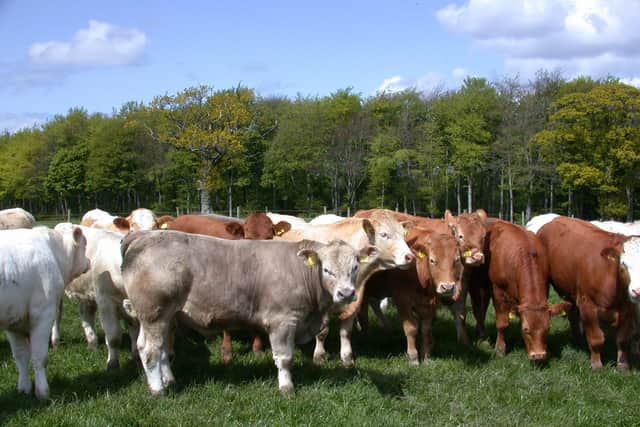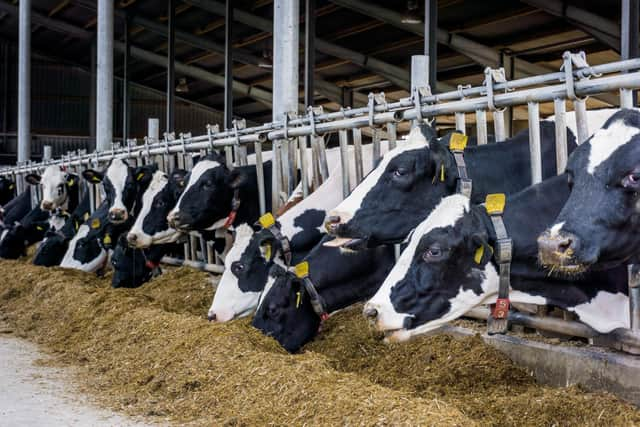How can DAERA defend a proposed cut to bTB reactor compensation values?
and live on Freeview channel 276
The consultation follows a direction from the Secretary of State for Northern Ireland, Rt Hon Chris Heaton-Harris MP, instructing Northern Ireland departments to launch public consultations on measures to support budget sustainability and raise additional revenue.
Views are being sought on whether the amount of compensation payable should be reduced on a phased basis, with a reduction to 90% of the bovine animal’s market value in the first year of implementation with a further reduction to 75% of the animal’s market value a year later.
Advertisement
Advertisement
So much for the background: as one might have expected it didn’t take long for the Ulster Farmers’ Union (UFU) to issue its initial response.


Speaking earlier this week in Ballymena, Union president, David Brown, confirmed that the organisation will legally challenge any attempts to reduce bovine tuberculosis (bTB) valuations.
He further explained: “We have already made veterinary service officials within the department of agriculture fully aware of our views on this important manner.
“Livestock farmers are incensed that DAERA should even consider taking such steps at this time.”
Advertisement
Advertisement
According to Brown, the UFU has already received initial legal advice regarding the scope of the public consultation. He is particularly keen that as many farmers as possible should take part in this process.


Specifically, David Brown feels that the term ‘compensation’ is a misnomer when associated with the removal of BTB reactor animals.
“Farmers are not compensated in any way for the loss of revenue incurred in these circumstances. This is a critically important issue for livestock farmers across Northern Ireland. The Ulster Farmers’ Union will not accept any reduction in the budget to cover the valuation of reactor cattle. Nor will we accept any proposal aimed at farmers having to pay the cost of bTB testing.”
Meanwhile, the UFU remains committed to reducing the £25M annual budget associated with the current bTB testing and eradication programme.
Advertisement
Advertisement
Union deputy president, William Irvine, believes this can be achieved if DAERA acts to include a wildlife cull in future bTB eradication measures.
Such a provision was included in a programme of action agreed between DAERA and the various farm stakeholder groups during 2023. As part of this initiative, it was agreed that farmers would fund the wildlife-associated measures, courtesy of a levy, linked to cattle and milk sales.
However, the implementation of these measures was stymied in the wake of a recent judicial review ruling sought by a number of animal welfare groups.
DAERA has decided not to appeal the outcome of the judicial review. Rather officials will seek to have primary legislation enacted by a future Stormont Executive.
Advertisement
Advertisement
William Irvine commented: “We know that addressing the issue of bTB in badgers is important. The most recent evidence coming from parts of England, where wildlife culls take place, confirm a significant fall-off in bTB reactor rates.
He concluded: “Farmers want to see populations of healthy badgers thriving in Northern Ireland’s countryside.
“Making this happen requires the implementation of realistic bTB eradication measures.”
The public consultation process
UFU leaders want as many farmers in Northern Ireland to participate in the public consultation.
Advertisement
Advertisement
So what’s actually contained in the documents released by DAERA, tying in with this process?
According to DAERA, the purpose of this consultation is to seek views on a proposal to introduce a percentage reduction in the total amount of compensation paid by government for cattle compulsory removed under the DAERA bTB Eradication Programme.
At present, government pays 100 percent market value to the owner of any animal removed under the Programme. The cost to government of delivering the bTB programme in Northern Ireland has increased significantly over the last number of years.
In the five financial years between 2016/17 and 2020/21, the average annual cost of delivering the programme was £38.4million with an average annual compensation bill of £21.35million.
Advertisement
Advertisement
However, in 2022/23, the Programme cost had risen to a record £53m with compensation accounting for just over £38m of this amount.
Edwin Poots
In March 2022, former DAERA Minister, Edwin Poots, MLA, launched a new long-term strategy to reduce and, ultimately, eradicate bovine Tuberculosis (bTB) from Northern Ireland.
DAERA is confirming that, at the launch of the strategy, the bTB herd incidence rate in Northern Ireland stood at 8.85%.
Since then, disease levels have continued to rise and herd incidence currently stands at 10.31% (for the 12 months to the end of October 2023).
Advertisement
Advertisement
This has resulted in a corresponding rise in the costs associated with the Programme and the compensation paid within it.
Further, the average market value of an animal removed under the bTB Programme in October 2021 was £1,632.50. This had risen to £1,874.36 by October 2023.
TB Strategic Partnership Group
DAERA also points out that the aforementioned bTB Eradication Strategy was informed by the independent expert advisory group, the TB Strategic Partnership Group (TBSPG).
The new organisation was tasked by the Department with developing a new strategic approach to tackle bTB in Northern Ireland.
Advertisement
Advertisement
This was published in 2016, following which DAERA’s response was subject to a public consultation n process in 2017.
The Department further consulted on proposals for a new long-term Strategy, based closely on the recommendations made by the TBSPG, in 2021.
Following Ministerial decisions on the way forward for bTB Eradiation, a new strategy for eradicating bTB in Northern Ireland was launched in March 2022.
Compensation payments
DAERA points out that, courtesy of the two aforementioned public consultations, it sought views on two proposals relating to compensation regime change within the bTB Programme.
Advertisement
Advertisement
One was a phased reduction over two years in compensation paid following the slaughter of an animal for disease control from the existing full market value of that animal to 75% of that value.
The other was linked to a cap in any such compensation payments.
According to DAERA, the TBSPG had recommended a compensation cap. However, it stopped short of recommending an immediate reduction in the percentage of market value paid in compensation.
While recognising this could deliver an improvement in farming behaviour towards keeping herds free from bTB, TBSPG also recommended that should be reviewed once stakeholder support had grown.
Advertisement
Advertisement
Moreover, TBSPG also recommended that the cap on compensation be introduced first and its impact is reviewed before the further consideration would be given to introduction of a percentage reduction in compensation paid.
Covid
The briefing papers that accompany the new bTB-related public consultation confirm DAERA’s support to change the current compensation system.
However, it acknowledged that there were many pressures impacting on the farming industry as a result of the Covid pandemic and other economic pressures.
In addition, the 2022 bTB eradication strategy acknowledged that respondents had raised a number of other potential proposals for sharing the cost of the bTB programme in responses to the previous year’s consultation.
Advertisement
Advertisement
Edwin Poots, therefore, determined that changes to the compensation regime should not be made at that time but reviewed two years following full implementation of the Strategy to include the commencement of wildlife intervention.
Since then, a judicial review taken against DAERA has concluded that the chosen wildlife intervention policy, that being a non-selective cull of badgers in areas of high bTB incidence and high badger density, can no longer progress and must be subject to further public consultation.
While in recent months, the disease incidence rate does appear to have levelled off, the overall rise in disease rates since 2020, alongside the increase in the market value of cattle, has resulted in a significant increase in the existing bTB programme costs, in particular the compensation paid to farmers.
Valuation versus compensation
Significantly, DAERA acknowledges that, whilst compensation is paid at 100% of an animal’s pre-disease value, this does not cover all of the additional costs incurred on farms due to the testing regime, the subsequent removal of animals from the herd or movement restrictions as a result of herd breakdowns.
Advertisement
Advertisement
In addition, a breakdown also has significant financial implications for farmers, most significantly through loss of production and also through loss of genetics. In the Outline Business Case (OBC) prepared to support the implementation of the bTB Eradication Strategy these costs have been estimated at around £10million each year. The position remains, however, that the costs of the Programme cannot be sustained particularly in the context of ongoing financial constraints across all government departments.
Secretary of State
So, it is against this background, that the Secretary of State has directed this consultation be progressed to gather views on a reduction in the level of compensation paid.
The outcome of this consultation will provide options for incoming farm ministers to take decisions to ensure a more sustainable footing for public finances, including that of the bTB Programme.
Rationale for compensation change
DAERA is now indicating that the rationale behind changing compensation arrangements remains two-fold: to rebalance the costs of tackling this disease between the public and private sectors to ensure government can continue to support the bTB eradication programme; and, in so doing, to encourage cultural and attitudinal changes, incentivising herd keepers to fully embrace the role they have in protecting their herd from bTB.
Advertisement
Advertisement
When the issue of compensation was last explored by the Department in 2021/22 around 16,000 cattle were being compulsory slaughtered for bTB control annually.
By 2022/23 this figure had increased to 21,655. In 2022/23, there were 2,383 herd breakdowns.
DAERA points out that the aim of a 75% compensation rate is to strike a balance between reasonable compensation and cutting costs.
This approach would allow government can ensure that the bTB eradication programme remains sustainable, while encouraging herd keepers to take all reasonable steps to prevent disease.
Advertisement
Advertisement
Courtesy of the current public consultation, DAERA is seeking a proposal to reduce the amount of compensation payable on a phased basis.
The envisaged approach would entail reduction to 90% of the animal’s market value in the first year of implementation and further reduced to 75% of the animal’s market value a year later.
Those participating in the public consultation will be asked one fundamental question, on line:
Do you agree that public expenditure savings should be made by reducing the compensation rate for animals removed under the bTB Programme?
The question must be answered on a ‘Yes’ or ‘No’ basis. Provision is also made for participants to include all relevant commentary on the issue.